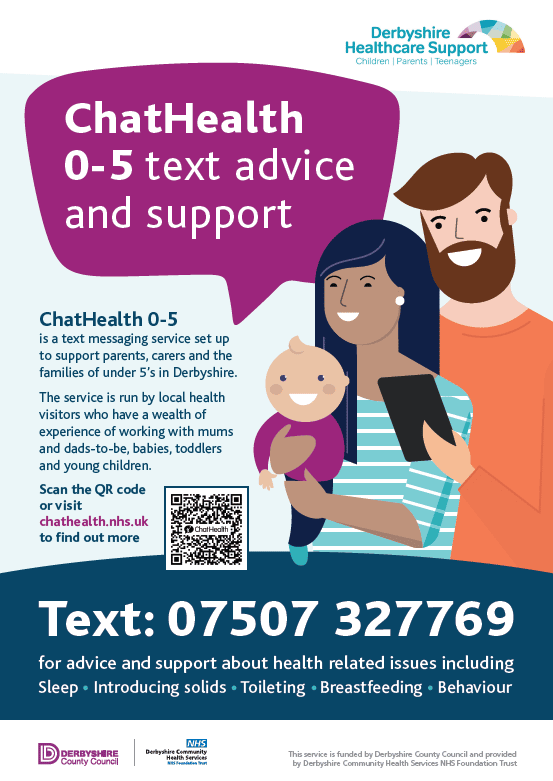23rd January 2023
We are delighted to share this Voices blog from Helen Williams and Julie Crook of Derbyshire Family Health Service, explaining how ChatHealth has improved Derbyshire’s health visiting offer.
Historically, if you were a parent needing health visitor support in Derbyshire, you would have called the local team and left an answerphone message. These messages would be dealt with once the health visitor returned to base and had time to review them. With increasingly busy caseloads, managing answerphones was not always prioritised, leading to clinical risk and complaints.
In 2019 Single Point of Access (SPA) models became a popular solution for managing telephone enquiries. By providing one phone number for all Children’s Services, calls could be answered by admin staff, with the support of Health Visitors on a rota system to respond to clinical queries. Initial challenges included clinician sickness and the prioritising of safeguarding caseloads. In December 2019, secondment opportunities for 2 WTE Health Visitors to work in SPA were established.
During the pandemic home visiting was limited to new birth and safeguarding visits, with universal and universal plus families being supported by SPA, resulting in the rapid development of this as a new service.
Support with feeding, weaning, general health, and development queries are consistently the most common reasons for contacting SPA clinicians via telephone or ChatHealth.
To establish if ChatHealth improved the health visiting offer, enhanced feedback questions were introduced using the Plan Do Study Act (PDSA) cycle and model for improvement. By asking service users where they would have gone for support had ChatHealth not been available and for marks out of 10 for satisfaction, we demonstrated ChatHealth’s impact on the health visitor’s workload and reduced avoidable appointments for the Primary and Secondary Care providers and service user’s satisfaction.
In Summer 2022 we completed the enhanced feedback pilot over 12 weeks. Following 476 ChatHealth conversations we received 160 feedback comments, all positive with 39 parents providing enhanced feedback. 36 reported they would have made a GP appointment, 1 intended to access A&E and 2 said they would have worried on their own. Other feedback demonstrated improved inclusivity as ChatHealth empowered a parent living with motor neurone disease, who struggled with speech, to resolve appointment clashes. Busy parents fed back how convenient the service was as they didn’t have to wait for a call back. It was noted by clinicians how parents with anxiety could be supported by ChatHealth and required fewer home visits. During the same period the SPA Health Visitors completed 1,407 phone consultations, so ChatHealth now represents the preferred choice for 25% of the incoming enquiries to the SPA clinicians.
According to a recent Kings Fund study in 2020, an average GP appointment costs the NHS £39.23 and an A&E visit costs from £77 – the total savings demonstrated by our feedback at its lowest level is £1,489.00. When applying these savings to all conversations had, and taking the product licencing cost of ChatHealth into account, there is a potential annual cost saving of £68,207.04. In addition, the economic impact of ChatHealth has been demonstrated nationally, that a service would require four additional members of staff to deliver face-to-face contacts for the same number of contacts that could be achieved via messaging with one member of staff. This frees up staff capacity to deliver face-to-face or telephone contact to those most in need.
Average patient satisfaction scores were 9.6/10 demonstrating how ChatHealth is valued and meeting population needs. The feedback demonstrated that the service supports working parents to access health advice when unable to answer the phone, and prevents avoidable GP appointments and A&E attendances.
In summary, ChatHealth has enhanced the health visiting offer, improving accessibility, and is a popular, user friendly way for our service users to access health visiting support, whilst preventing avoidable appointments for other Primary and Secondary care providers.







